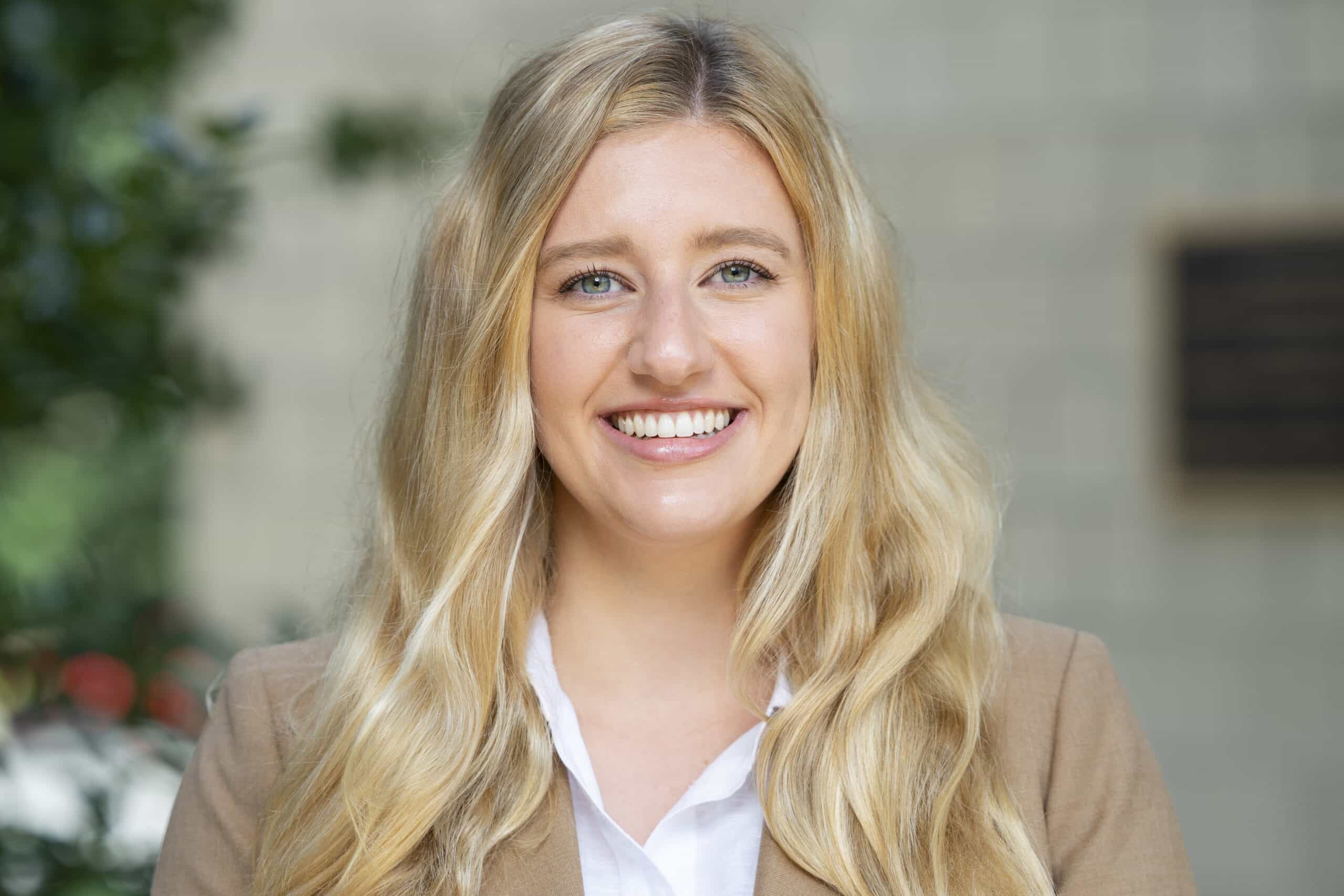How one student is helping nonprofit organizations to better measure their capacity building.

This interview highlights the rewarding research work of Lilly Parker, an MPA student as she works with Dr. Teshanee Williams and nonprofit organizations to find new ways to objectively measure what these organizations use to achieve their missions.
Q: Where are you from originally?
Lilly Parker: I’m from Louisville, Kentucky. After undergrad at Wake Forest, I moved to Atlanta to teach. But now, I’m loving life in North Carolina, especially the Triangle area. I live in Chapel Hill, but I have friends in Durham and Raleigh, so it’s great having all three cities nearby. The Triangle area has so much to offer, and it’s such a welcoming place. Living in a college town like Chapel Hill has been a unique experience. There’s a real sense of community and creativity here.
Q: Can you tell me a little bit about your role as a Research Assistant?
Lilly Parker: Yes! So, I work with Dr. Teshanee Williams, who is the main nonprofit management professor in the MPA program. This semester, she’s teaching the nonprofit management class online, and next semester she’s teaching a class on local government and nonprofit collaboration.
I was really excited when I got paired up with her for my RA job because I’ve always been interested in nonprofit management. One thing that attracted me to the UNC MPA program was its focus on cross-sector collaboration, especially between nonprofits and local governments. So, when I learned I’d be doing research with Dr. Williams, I was thrilled. Her research is centered around nonprofit capacity building and collaboration between the public sector and nonprofits.
Q: Can you tell me more about the concept of capacity building that you’re working on?
Lilly Parker: Absolutely! Nonprofit capacity refers to everything an organization uses to achieve its mission. We are examining five different components of capacity: organizational, resource, network, political, and programmatic.
- Resource capacity building includes bolstering development capital, securing long-term operating support, obtaining resources for stabilization and expansion, increasing access to funders, and balancing portfolio risk.
- Organizational capacity building ensures that the NPO has an effective executive director, competent and stable staff, effective fiscal management, board development and leadership, the ability to manage projects and growth, and an effective evaluation system.
- Programmatic capacity building focuses on employees possessing skills related to specific program areas and organizing, the organization’s responsiveness to changing community concerns, and the presence of mutually supportive programs.
- Network capacity building involves the NPO forming strong relationships with other organizations and institutions, promoting their agenda externally, and gaining access to non financial resources.
- Political capacity building includes encouraging community participation, gaining political leverage, educating constituents and partners, and managing possible conflict among stakeholders.
When I first met with Dr. Williams, she explained that in her previous research, review boards often mentioned the need for a more objective way to measure capacity. Most current methods rely on surveys filled out by executive directors, who might unknowingly or knowingly answer in ways that reflect positively on their organizations. So, we’re designing an objective way to measure capacity. It’s really exciting because I’ve been involved since the beginning stages, and Dr. Williams is walking me through every step.
Q: What have you worked on so far?
Lilly Parker: We started by reviewing the existing literature on how capacity is measured, focusing on whether it has been measured objectively in the past. I wrote a literature review based on our findings, and we decided on our research variables. We’re looking at how revenue diversification—like getting funds from many different sources such as government grants, foundations, earned income, and/or individual donations—correlates with each component of capacity.
Right now, we’re finishing up designing the tool that we will use to measure each component of a nonprofit’s capacity. We are also beginning to collect available data on Smart Start, the organization we will be studying. Dr. Williams has been an incredible mentor, guiding me through each phase. This has been especially helpful since I didn’t have a ton of prior research experience.
Q: Did you always know you wanted to work in the nonprofit sector? What drew you to this position?
Lilly Parker: My journey into the nonprofit sector started in high school and undergrad. I volunteered with many organizations like the Boys and Girls Club in Louisville and Latino Community Services in Winston-Salem. These experiences helped me realize that I love volunteering for nonprofits and working with kids. After college, I taught for three years but quickly realized that there were many systemic issues affecting my students that I couldn’t address as a teacher. That’s what inspired me to pursue the MPA—I want to work in organizations influencing system-level change. Nonprofits have always appealed to me because of their mission-driven work and the autonomy they have in how they operate.
Q: That’s such an inspiring journey. How has it been working with Dr. Williams?
Lilly Parker: She’s incredible to work with. We meet weekly, and she’s very committed to guiding her students. She walks me through her thought process, explains what we’re trying to achieve, and then trusts me to carry out the work. It’s been a fantastic learning opportunity.
One thing I really appreciate about Dr. Williams is her commitment to making sure that her research directly benefits the communities and organizations we study. She ensures that our research provides practical tools that nonprofits can use to improve their capacity.
Q: What are your plans post-graduation?
Lilly Parker: I’m still figuring that out! I want to work in the nonprofit sector, ideally as an advocate for children and families. The MPA program is great because it’s giving me a wide range of skills, from law to financial management to HR. I’m taking grant writing next semester, which I think will be super useful. I’m leaning towards roles in either development or program management, but I’m open to exploring different options.
